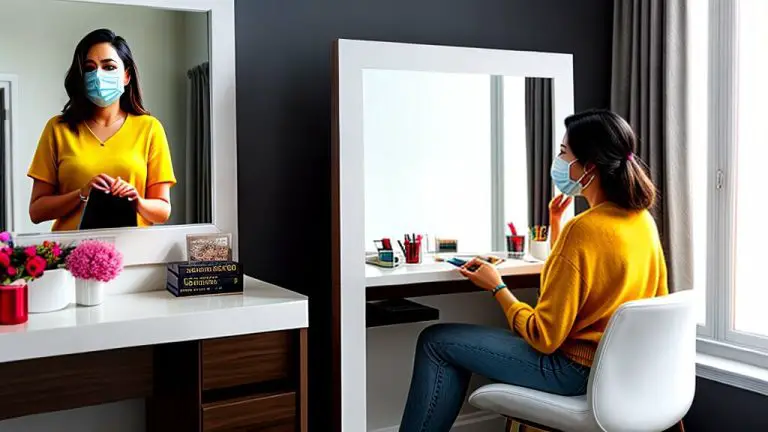Having a lighter and brighter complexion is a desire for many, but achieving it can be a challenging task. There are various methods and products available in the market, and different factors affect each individual’s skin. This article will explore practical ways to lighten your skin tone, address common concerns and misconceptions about skin lightening, and know how old you must be to buy a lighter.
Key Takeaways:
- Several methods to lighten skin include topical products, professional treatments, and natural remedies.
- Safety should always be a priority when striving for lighter skin, and consulting with professionals is essential.
- Your overall lifestyle and mindset play a crucial role in skin health.
Understanding Skin Lightening Methods
When it comes to achieving a lighter skin tone, there are various methods available that can help. These methods can be broadly divided into topical products, professional treatments, and natural remedies.
Topical Products for Lighter Skin
Topical products, such as creams, lotions, and serums, are among the most popular methods for achieving a lighter complexion. These products contain ingredients that work by reducing the amount of melanin in the skin, which is responsible for giving it its color.
When choosing a topical product for skin lightening, it’s important to look for ingredients like hydroquinone, kojic acid, and vitamin C. These ingredients are known for their brightening and clarifying effects on the skin.
It’s also important to note that topical products can take several weeks to show results, and consistency is key. Incorporating these products into your skincare routine can effectively achieve a lighter skin tone gradually.
Professional Skin Lightening Treatments
Professional skin-lightening treatments can be a great option for a more immediate and dramatic result. Dermatologists or licensed skincare professionals typically perform these treatments and involve advanced techniques and technologies.
Chemical peels, laser therapy, and microdermabrasion are some of the most popular professional skin-lightening treatments. These methods work by removing the top layer of the skin, which contains melanin, and promoting the growth of new, lighter skin cells.
However, it’s important to note that these treatments can be expensive and may require multiple sessions to achieve the desired result. Additionally, they may have some side effects like skin irritation, redness, or sensitivity.
Natural Remedies for Lighter Skin
For those who prefer a more natural approach to skin lightening, several ingredients and remedies can help. These include ingredients like lemon juice, turmeric, and aloe vera, which have been shown to have brightening and skin-clearing properties.
It’s important to note that natural remedies may take longer to show results compared to other methods, and the effects may be less dramatic. Additionally, it’s crucial to use these remedies safely and follow any precautions or guidelines to avoid irritation or side effects.
Overall, various skin-lightening methods are available, each with its own benefits and limitations. Understanding these methods and their effectiveness can help you decide which approach is best for you.
Topical Products for Lighter Skin
Topical products are a popular method for achieving lighter skin. These products typically contain active ingredients that inhibit melanin production to reduce hyperpigmentation and give the skin a lighter appearance.
When choosing topical products for lighter skin, it’s essential to look for safe and effective ingredients. Some common ingredients include:
| Ingredient | Benefits |
|---|---|
| Vitamin C | Helps reduce hyperpigmentation and brighten the skin |
| Kojic acid | Lightens the skin by inhibiting melanin production |
| Glycolic acid | Removes dead skin cells, revealing brighter, lighter skin |
It’s important to note that some topical products may be too harsh for certain skin types and can cause irritations or other adverse effects. Therefore, it’s essential to test new products gradually and see how your skin responds to them.
Incorporating topical products into your skincare routine can be an effective way to achieve a lighter complexion. However, using these products regularly and following the instructions carefully is essential to ensure optimal results.
Choosing the Right Topical Products for Your Skin Type
The effectiveness of topical products for skin lightening may depend on your skin type. For example, those with dry skin may benefit from moisturizing creams or lotions containing lightening agents to prevent dryness and flakiness.
If you have sensitive skin, it’s crucial to look for gentle products free of harsh chemicals that may cause irritation. Natural ingredients such as aloe vera, chamomile, and green tea extract can be beneficial for reducing inflammation and soothing sensitive skin.
Consulting with a dermatologist can help determine which topical products best suit your skin type and goals.
Professional Skin Lightening Treatments
Professional treatments may be your best option if you’re looking for a more dramatic change in your skin tone. Licensed professionals perform these treatments, often more effective than at-home remedies. However, they can also be more costly and may come with more risk.
Chemical Peels
Chemical peels involve applying a chemical solution to the skin to remove the top layer of cells, revealing a newer, lighter layer of skin underneath. Several types of chemical peels range in strength from mild to deep. Deeper peels may require sedation or anesthesia and have a longer recovery time but can provide more significant results.
| Advantages | Disadvantages |
|---|---|
|
|
Laser Therapy
Laser therapy involves using a laser to target and break down melanin in the skin, leading to a lighter overall complexion. This treatment may be used for larger body areas, such as the face, arms, or legs.
| Advantages | Disadvantages |
|---|---|
|
|
Microdermabrasion
Microdermabrasion involves using a special device to buff away the top layer of skin, revealing a smoother, brighter complexion. This treatment is less invasive than chemical peels or laser therapy, making it a good option for sensitive skin patients.
| Advantages | Disadvantages |
|---|---|
|
|
When considering professional treatments, it’s important to consult with a licensed professional to determine the most appropriate treatment for your skin concerns. They can also guide aftercare and any potential risks or side effects.
Section 5: Natural Remedies for Lighter Skin
For those who prefer natural methods for achieving lighter skin, there are a variety of ingredients and DIY recipes that can help. Here are some of the most effective natural remedies:
- Lemon juice: The citric acid in lemon juice is a natural skin lightener. Apply it to your skin for 10-15 minutes before washing it with warm water.
- Papaya: This fruit contains enzymes to help exfoliate and lighten the skin. Mash a ripe papaya and apply it to your skin for 15-20 minutes before rinsing it off.
- Turmeric: This spice has been used for centuries in Ayurvedic medicine for its skin-brightening properties. Mix a teaspoon of turmeric powder with honey and apply it to your skin for 10-15 minutes before washing it off with lukewarm water.
- Aloe vera: This plant has anti-inflammatory properties and can help soothe and lighten the skin. Apply aloe vera gel to your skin and leave it on for 20-30 minutes before washing it off.
- Tomato: The high levels of vitamin C in tomatoes make them a natural skin brightener. Apply tomato pulp to your skin for 10-15 minutes before washing it with cool water.
While natural remedies can be effective, it’s important to remember that they may not provide the same dramatic results as professional treatments or topical products. Additionally, some natural ingredients can irritate the skin, so it’s important to patch test before using them on larger areas of your body.
Tip: When using lemon juice or other acidic ingredients, always wear sunscreen with a high SPF to protect your skin from sun damage.
Tips for Achieving Lighter Skin
There are various ways to achieve a lighter skin tone, but doing it safely and effectively is essential. Here are some practical tips to help you on your skin-lightening journey:
- Protect your skin from the sun: Exposure to harmful UV rays can darken and damage your skin. Wear protective clothing, use sunscreen with at least SPF 30, and avoid prolonged sun exposure.
- Exfoliate regularly: Dead skin cells and impurities can make your skin look dull and uneven. Use a gentle exfoliating scrub or chemical exfoliant to remove dead skin cells and reveal brighter, smoother skin.
- Hydrate your skin: Drinking plenty of water and using hydrating skincare products can help your skin look supple and radiant. Dry skin can make your complexion appear dull, so moisturize regularly.
- Follow a healthy diet: Eating a balanced diet rich in vitamins and minerals can improve your skin’s health and appearance. Antioxidant-rich foods like berries, leafy greens, and nuts can help protect your skin from damage.
- Try skin-lightening products: Look for skincare products containing effective skin-lightening ingredients like Vitamin C, Kojic Acid, or Glycolic Acid. Incorporate these products into your daily skincare routine for the best results.
- Consult with a professional: If you’re considering professional skin-lightening treatments, it’s essential to consult with a licensed dermatologist or aesthetician. They can recommend the best treatment for your skin type and guide you in achieving safe and effective results.
Safe Ways to Lighten Your Skin
When it comes to lightening your skin, it is important to prioritize safety and avoid methods that can cause harm to your skin. Here are some safe ways to achieve a lighter complexion:
- Use sunscreen: Sun protection is a key factor in preventing skin damage and maintaining an even skin tone. Apply sunscreen with at least SPF 30 every day, even on cloudy days, and reapply every two hours if you are outdoors.
- Choose safe products: When selecting skincare products, it is important to opt for those that do not contain harmful ingredients such as hydroquinone, mercury, and steroids. Look for FDA-approved products that have been clinically tested for safety and effectiveness.
- Consult with a professional: If you are considering professional skin-lightening treatments, consult a licensed and experienced practitioner. They can evaluate your skin and recommend the best course of treatment based on your skin type and concerns.
- Take a gradual approach: Avoid using harsh chemicals or excessive amounts of topical products that can cause irritation or damage to your skin. Instead, take a gradual approach and monitor your skin’s reaction to new products and treatments.
Note: It is essential to remember that your skin color is a result of your genetics and melanin production. Attempting to drastically alter your skin tone can result in damage to your skin and potentially lead to long-term consequences.
Ultimately, the best approach to skin lightening is to prioritize safe and healthy practices and consult a professional when in doubt. With patience and care, you can achieve a healthy and radiant complexion.
Factors Affecting Skin Lightening
Various factors can influence the effectiveness of skin-lightening methods. Understanding these factors can help you choose the most appropriate method for your skin type and condition:
- Genetics: Skin color is determined by genetics, so some individuals may have a higher concentration of melanin, making it more difficult to lighten their skin.
- Sun exposure: Prolonged exposure to UV rays can cause skin damage and lead to uneven pigmentation. Using sunscreen and avoiding excessive sun exposure is crucial to prevent further damage.
- Hormonal changes: Changes in hormone levels during pregnancy or menopause can cause skin discoloration.
- Age: With age, the skin produces less collagen and melanin, leading to a dull and uneven complexion.
It is important to note that some skin-lightening methods, such as those using harsh chemicals or illegal substances, can cause irreversible damage to the skin. Choosing safe and effective methods and consult with a dermatologist if necessary is essential.
Maintaining and Enhancing Lighter Skin
Once you’ve achieved a lighter skin tone, it’s important to maintain and enhance your results. Here are some tips for keeping your skin looking its best:
- Continue to use sunscreen daily, even on cloudy days or indoors. Aim for a broad-spectrum product with at least SPF 30.
- Exfoliate regularly to remove dead skin cells and promote cell turnover. Avoid over-exfoliating, as this can irritate you.
- Stay hydrated by drinking plenty of water throughout the day. This can help keep your skin moisturized and healthy.
- Eat a balanced diet rich in fruits, vegetables, and whole grains. These foods contain essential vitamins and nutrients that support skin health.
- Consider incorporating skin-brightening ingredients like vitamin C, kojic acid, or arbutin into your skincare routine.
- Follow a consistent skincare routine with products tailored to your skin’s needs. This can help maintain your results and prevent new discoloration.
- Consider touch-up treatments, such as chemical peels or laser therapy, to maintain and enhance your results over time.
Achieving and maintaining lighter skin requires patience, commitment, and attention to detail. By taking care of your skin and utilizing safe and effective methods, you can achieve a more radiant and even complexion.
Addressing Common Concerns and Misconceptions
Skin lightening can be a sensitive topic, often surrounded by misconceptions and concerns. Let’s address some of the common ones.
Myth 1: Skin lightening is only for people with dark skin tones.
False. People of all ethnicities can benefit from skin-lightening techniques.
Myth 2: Skin lightening is unsafe and can cause health problems.
While certain ingredients and methods can pose health risks, when done safely, skin lightening can be a safe and effective way to enhance one’s complexion.
Myth 3: Skin lightening is permanent.
Not necessarily. Maintenance and regular treatments may be required to maintain results.
Myth 4: Skin lightening is only for aesthetic purposes.
While many individuals pursue skin lightening for cosmetic reasons, it can also help with hyperpigmentation and melasma.
Concern 1: Skin-lightening products contain harmful ingredients.
Some skin-lightening products may contain potentially harmful ingredients like hydroquinone and mercury. Look for products that use natural and safe ingredients, and consult with a dermatologist if unsure.
Concern 2: Skin lightening can damage the skin.
Overuse of certain methods, like chemical peels and laser treatments, can damage the skin. Consulting with a professional and following a proper skincare routine can help mitigate these risks.
“It’s important to approach skin lightening with caution and prioritize safety. By doing research, consulting with professionals, and using safe methods and products, it’s possible to achieve a healthy and radiant complexion.”
Lifestyle and Mindset for Healthy Skin
Healthy skin is not just about using the right products or treatments. Your lifestyle and mindset can also play a significant role in achieving and maintaining healthy skin. Here are some tips to help you prioritize lifestyle and mindset factors:
- Manage Stress: Stress can cause various skin issues, including acne breakouts, wrinkles, and dryness. Incorporate stress management techniques into your daily routine, such as meditation, yoga, or deep breathing exercises.
- Get Enough Sleep: Lack of sleep can also affect your skin’s health. Aim for 7-9 hours of sleep each night to help your skin regenerate and repair itself.
- Stay Hydrated: Drinking enough water is crucial to maintaining healthy skin. Aim for at least 8 glasses of water a day to keep your skin hydrated from the inside out.
- Follow a Balanced Diet: A healthy diet can give your skin the necessary nutrients to thrive. Include plenty of fruits and vegetables, lean proteins, and healthy fats.
- Practice Good Hygiene: Proper hygiene can also help prevent skin issues. Wash your face twice daily, avoid touching your face with dirty hands, and regularly clean your makeup brushes and other beauty tools.
- Protect Your Skin from the Sun: Sun damage can lead to skin discoloration, wrinkles, and even skin cancer. Protect your skin by wearing sunscreen, a hat, and long-sleeved clothing and avoiding direct sun exposure during peak hours.
- Invest in Self-Care: Taking time for self-care can help reduce stress and promote healthy skin. Treat yourself to a massage, take a relaxing bath, or practice a hobby you enjoy.
By prioritizing these lifestyle and mindset factors, you can support your skin’s health and contribute to achieving and maintaining healthy, radiant skin.
Conclusion
In conclusion, achieving lighter skin is a personal choice that requires research and careful consideration. Various methods include topical products, professional treatments, and natural remedies. It’s important to prioritize safety and consult with professionals when necessary. Maintaining a healthy lifestyle and positive mindset can also contribute to overall skin health and radiance. Remember, patience, consistency, and education are key to successful skin lightening.

I’m Alfred Davis, and I’m all about lighters. Hailing from the great state of Texas, USA, I’ve cultivated a deep passion for these fascinating gadgets. With years of hands-on experience and a burning curiosity (pun intended), I’ve become an expert in all things related to lighters.
My journey with lighters began as a hobby and quickly became a full-blown obsession. I’ve explored the diverse world of lighters inside and out, from classic Zippo designs to modern plasma arc models. I’ve tested, tinkered with, and even collected rare pieces while learning the intricate mechanics and unique histories behind each one.
Through my writing, I aim to share my knowledge, insights, and reviews to help you make informed decisions about choosing the perfect lighter. Whether you’re a seasoned collector or just looking for a reliable fire source, I’ve got you covered. Join me in unraveling the fascinating realm of lighters right here at LightersInfo, where ignition meets expertise.
Alfred Davis

